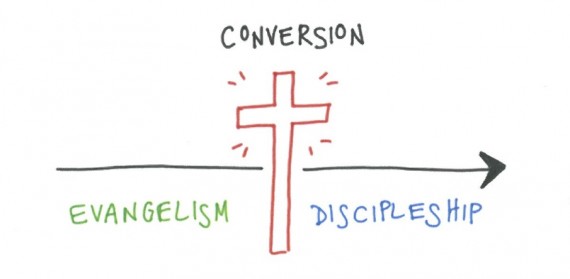 So we’ve seen the two basic models of discipleship and the pros and cons of each. Ideally, there should be a way to blend the two so we keep the positive aspects of each while avoiding the negative.
So we’ve seen the two basic models of discipleship and the pros and cons of each. Ideally, there should be a way to blend the two so we keep the positive aspects of each while avoiding the negative.
Here is what Matt Chandler is doing at his church:
Celebrate Change
You must create an air that celebrates life transformation and change.
These things must be championed and celebrated from the stage in the service every single week. Use video and testimony to celebrate growth, transformation, and movement. It cannot be a sermon series once a year. You have to constantly, constantly bang the drum of progressive sanctification. And you MUST celebrate more than just the “miracle.”
Yes, put up the guy who drank and drank and drank, and then came to Christ, and hasn’t desired a drink since. But also, champion the guy who is still raw, who still struggles. You get a guy up there to say, “I’m struggling, but let me tell you where I see God.”
Create On-Ramps
Have lots of “on ramps” and “off ramps.” Make it easy for people to get involved in various ways of spiritual transformation, and make it ways for them to just rest in what they have learned.
Allow times when you just back away from everything, and not try to control things, and just let them sit, rest, and germinate.
Keep Flexible
The mission and end goal is sacred, but nothing else is. Ask yourself: What stirs your affections for Jesus Christ? And what robs you of that affection? Almost all of us have different answers to these questions.
You must be flexible enough not to dictate to the people in your church how they are to grow spiritually. Some read Edwards. Some play the piano. Some go to the graveyard. Some go the art museum. We’ve got to figure out how to give our people freedom to press on toward the Lord.
You can lay some track for them, but you can’t punish people when they deviate off that track.
Be Relational
There needs to be a relational aspect to everything. Everything. Here are some ways to make things relational:
Home groups. You can’t just throw people in a room and have community together. We need to try to help people build community, but it is very, very difficult. If they already have community, encourage them to stay with that group. Tell the older people they have a fishing license, and you are giving them a stocked lake. Tell them to look around and invite a couple over for dinner so they can pour their lives into someone younger. If you try to assign people to relationships, it won’t work.
Recovery ministry. There are lots of “short circuits” that people need help with. Drug. Alcohol. Relationships. Porn. Anger. Eating.
Apply your Teaching. Whatever teaching you do, be heavy on application.
Use Movies. Use film to teach theology. (But get a license to show these films.)
Children and youth. Don’t teach moralism. Don’t teach a fake, external morality. Teach strong doctrine, and then engage the parents in the process. Provide the parents tools to help teach the children. For example, suggest field trips they can take their children on and questions they can ask. If we teach the children at church, and this doesn’t get reinforced at home, all we are teaching our children is to compartmentalize their Church life from the rest of their life.
Be Patient
All of this takes time. Lots of time.
Find mature leaders. Pair them with 2-3 others, and tell them to walk together for 2-3 years intentionally. Then, these people turn around, and disciple 2 or 3 more, while they are still being discipled by those over them. So eventually, everyone is discipling and being discipled.
So, that is a broad-brush overview of what they are trying to do. He said to check back in 20-30 years to see if it worked. Do you have any ideas or suggestions on how we can encourage community while keeping people in the Word?



 Yesterday I introduced the
Yesterday I introduced the 
 Today, I will simply introduce in broad brush strokes the two most common methods of making disciples in our churches today.
Today, I will simply introduce in broad brush strokes the two most common methods of making disciples in our churches today. 


 The beginning of the service was announced by a funny little video which I won’t try to explain. The welcome was given by a young guy who explained that he was now happy in life again because he got a new iPhone. He was one of the first people in the country to get the iPhone on opening weekend, but the first day he had it, he went swimming with it for 20 minutes, and found out it wasn’t waterproof. So apparently, a week earlier in church he was pretty depressed because he had plunked down $600 for an iPhone and barely even got to show it off. Anyway, he took the phone into an Apple store and told them it was “broken” and they gave him a brand new one, no questions asked. So now life was good again.
The beginning of the service was announced by a funny little video which I won’t try to explain. The welcome was given by a young guy who explained that he was now happy in life again because he got a new iPhone. He was one of the first people in the country to get the iPhone on opening weekend, but the first day he had it, he went swimming with it for 20 minutes, and found out it wasn’t waterproof. So apparently, a week earlier in church he was pretty depressed because he had plunked down $600 for an iPhone and barely even got to show it off. Anyway, he took the phone into an Apple store and told them it was “broken” and they gave him a brand new one, no questions asked. So now life was good again.
